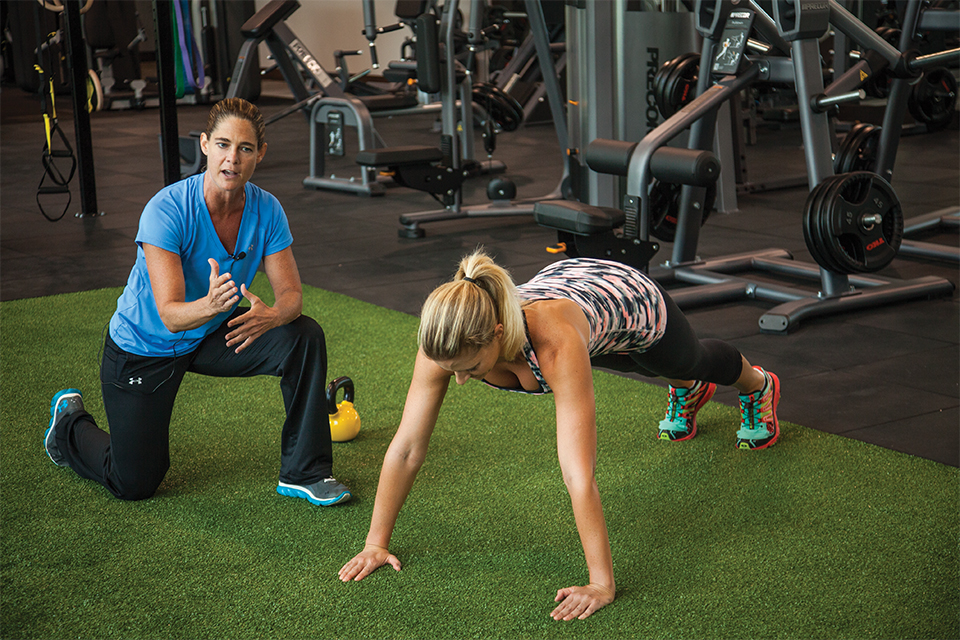Building Strength Through Movement

This month, Diane Vives guides trainer Jessica Clark through a variety of kettlebell carries and methods to improve and strengthen push-ups and pull-ups at Spark Fitness Club. These first exercises share information she gathered this summer from work with Gary Gray of the Gray Institute and Dan John (athlete, author of weightlifting books) about kettlebell carry positions and walks to gain postural integrity and strengthen the overall system. The second section of exercises focuses on three positions to challenge trunk stability learned from Martin Rooney (Training for Warriors) to improve the push-up. And last, Vives gives pointers on using isometric exercises to gain strength and build for the pull-up.
 Warm-up & Kettlebell
Warm-up & Kettlebell
Position Check
What You Need:
a kettlebell
Starting Position: standing, with strong posture
 Kettle Bell Carry Variations
Kettle Bell Carry Variations
Why: to help determine proper kettlebell weight and carry positions as well as build postural integrity and strength
BOTTOM-UP POSITION
Keeping a strong posture, hold the kettlebell with one hand in neutral wrist position
Raise the kettlebell into a bottom-up position (arm is bent, kettlebell is upside down at shoulder height) to check the weight—should be able to maintain hold and form for about 10 seconds

Overhead Position
Holding the kettlebell, raise the arm into a straight, streamlined position; elbow is straight, and the kettlebell hangs from the grip
Check for nice tabletop position of shoulders and hips
Take short steps forward, turn around, and come back
This is a self-limiting exercise—repeat only as long as the integrity in posture and arm position can be maintained

FRONT CARRY
Arm bent, elbow tucked nice and close to the body, kettle bell at shoulder height
Check for nice tabletop position of shoulders and hips
Take short steps forward, turn around, and come back
No lateral bending or loss of position in the trunk
This is a self-limiting exercise—repeat only as long as the integrity in posture and arm position can be maintained

Suitcase Carry
The kettlebell is held down at the side; it should feel as though you are punching downward (this packs the shoulder and engages the lats)
Check for nice tabletop position of shoulders and hips
Take short steps forward, turn around, and come back; the kettlebell should not swing as you walk
This is a self-limiting exercise—repeat only as long as the integrity in posture and arm position can be maintained
Thai Push-Ups
Why: these three great position changes challenges trunk stability and build upper-body strength
What You Need: floor space to maintain a prone position
Starting Position: “up” plank position, palms of hands shoulder-width apart on floor, back making a tabletop

Exercise:
Start in up position
As you move into the down position, punch the knee to the outside of the same-side shoulder (lateral transition)
Return to up position
As you go into the down position, perform a vertical punch with the knee (punch the knee straight to the chest)
Return to the up position
As you go into the down position, perform a cross punch with the knee (punch the knee toward the opposite shoulder)
Maintain integrity and trunk stability all the way through
Building Pull-Up
Why: challenges the weak points—the top and bottom—to build strength through isometric exercises
What You Need: pull-up bars
Starting Position: grasp the pull-up bar with palms facing away from the body; arms are straight
.jpg) Down Position Hang
Down Position Hang
Simply hang from the bar in the starting position
If at any point posture is compromised (space between ear and shoulder is lost, excessive bowing of the trunk occurs), stop
Start with hangs of 10–20 seconds and build up to 60 seconds, depending on your endurance
Up Position Hold
From the starting position, pull up into the top position
Maintain the top position as long as you can for a few holds; there is a tremendous amount of grip strength in just maintaining the top position
Let it go when postural integrity is lost






